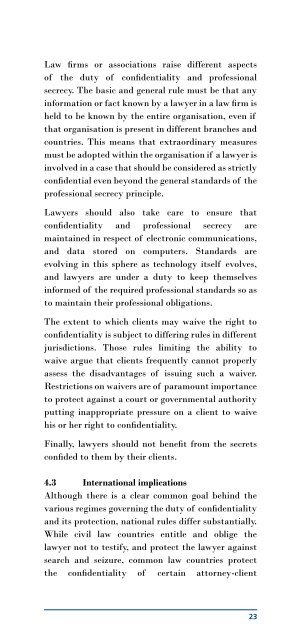IBA International Principles on Conduct for the Legal Profession
IBA International Principles on Conduct for the Legal Profession
IBA International Principles on Conduct for the Legal Profession
You also want an ePaper? Increase the reach of your titles
YUMPU automatically turns print PDFs into web optimized ePapers that Google loves.
Law firms or associati<strong>on</strong>s raise different aspects<br />
of <strong>the</strong> duty of c<strong>on</strong>fidentiality and professi<strong>on</strong>al<br />
secrecy. The basic and general rule must be that any<br />
in<strong>for</strong>mati<strong>on</strong> or fact known by a lawyer in a law firm is<br />
held to be known by <strong>the</strong> entire organisati<strong>on</strong>, even if<br />
that organisati<strong>on</strong> is present in different branches and<br />
countries. This means that extraordinary measures<br />
must be adopted within <strong>the</strong> organisati<strong>on</strong> if a lawyer is<br />
involved in a case that should be c<strong>on</strong>sidered as strictly<br />
c<strong>on</strong>fidential even bey<strong>on</strong>d <strong>the</strong> general standards of <strong>the</strong><br />
professi<strong>on</strong>al secrecy principle.<br />
Lawyers should also take care to ensure that<br />
c<strong>on</strong>fidentiality and professi<strong>on</strong>al secrecy are<br />
maintained in respect of electr<strong>on</strong>ic communicati<strong>on</strong>s,<br />
and data stored <strong>on</strong> computers. Standards are<br />
evolving in this sphere as technology itself evolves,<br />
and lawyers are under a duty to keep <strong>the</strong>mselves<br />
in<strong>for</strong>med of <strong>the</strong> required professi<strong>on</strong>al standards so as<br />
to maintain <strong>the</strong>ir professi<strong>on</strong>al obligati<strong>on</strong>s.<br />
The extent to which clients may waive <strong>the</strong> right to<br />
c<strong>on</strong>fidentiality is subject to differing rules in different<br />
jurisdicti<strong>on</strong>s. Those rules limiting <strong>the</strong> ability to<br />
waive argue that clients frequently cannot properly<br />
assess <strong>the</strong> disadvantages of issuing such a waiver.<br />
Restricti<strong>on</strong>s <strong>on</strong> waivers are of paramount importance<br />
to protect against a court or governmental authority<br />
putting inappropriate pressure <strong>on</strong> a client to waive<br />
his or her right to c<strong>on</strong>fidentiality.<br />
Finally, lawyers should not benefit from <strong>the</strong> secrets<br />
c<strong>on</strong>fided to <strong>the</strong>m by <strong>the</strong>ir clients.<br />
4.3 <str<strong>on</strong>g>Internati<strong>on</strong>al</str<strong>on</strong>g> implicati<strong>on</strong>s<br />
Although <strong>the</strong>re is a clear comm<strong>on</strong> goal behind <strong>the</strong><br />
various regimes governing <strong>the</strong> duty of c<strong>on</strong>fidentiality<br />
and its protecti<strong>on</strong>, nati<strong>on</strong>al rules differ substantially.<br />
While civil law countries entitle and oblige <strong>the</strong><br />
lawyer not to testify, and protect <strong>the</strong> lawyer against<br />
search and seizure, comm<strong>on</strong> law countries protect<br />
<strong>the</strong> c<strong>on</strong>fidentiality of certain attorney-client<br />
23


